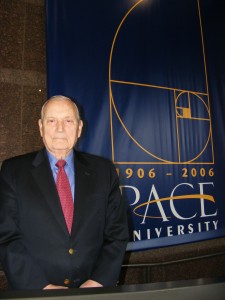
John Alan James, a former international management consultant and a professor at Pace University”™s Lubin School of Business, is concerned about the attacks on private-equity firms from Republican candidates in the presidential campaign and their impact on Americans”™ “belief in the free market system.” He is dismayed, too, by the divide between federal government and corporations and the uncertainty in the private sector over the regulatory terrain that will emerge from the Dodd-Frank Wall Street Reform and Consumer Protection Act.
“I can”™t think of any company in any business that isn”™t as confused as all hell about Dodd-Frank,” he said.
“The dealings right now between government and business have never been worse,” he said. “It is vindictive. It is disparaging from both sides. It is doing the capitalist free market system no good.”
James aims to bridge that divide in his new post as executive director of Pace University”™s newly established Center for Global Governance, Reporting and Regulation at the business school. Though he is still preparing the center”™s strategic plan, James said he will “bring in people from business and government and the professions to discuss critical issues facing the nation regarding the interface between government and business.” The center will create “an objective academic environment where people with different views can bring enlightenment to what can be done in a positive fashion to solve the problems facing both government and business.”
The center”™s focus will extend well beyond the Dodd-Frank Act and corporate governance and regulatory oversight in the U.S. James was selected for the post for his expertise on international corporate governance and the differences between American governance systems and regulations and those in Europe and Asia.
As founder of Management Counsellors International S.A. in Belgium, he advised major foreign companies and U.S. clients, including 50 Fortune 100 corporations, on market entry strategies and operating in foreign regulatory environments. He has lectured at leading European business schools and set up one of the first business-school courses that compared governance systems in countries around the world. At the Lubin school in White Plains, he currently teaches a course on regulatory strategy.
On Pace University”™s Manhattan campus, the new center on Feb. 2 will start a six-month, 75-hour program leading to a new Certified Compliance and Regulatory Professional Certificate. In collaboration with the Association of International Bank Auditors (AIBA), the school will train global financial services professionals in regulatory strategy and compliance. The first students will include AIBA members employed in nearly 100 branches and agencies of foreign banks doing business in the U.S.
James said four Pace professors and eight industry professionals spent nearly 1,000 hours developing the inaugural program. Though most center programs will be offered at Pace Plaza in Manhattan, James said he hopes to hold some events in Westchester County. For businesses, “I know there”™s as much confusion and uncertainty here,” he said.
Neil S. Braun, dean of the Lubin School of Business and former president of the NBC Television Network and chairman of Viacom Entertainment, in an announcement of the new center said international governance and regulation have never been more important to the business, government and public sector than they are today as changes in “the already-complex regulatory system” occur daily in nations around the world.
“The European Union is requiring new and tighter regulations, and the meetings of the G-20, the IMF and the Bank for International Standards, Basel, are introducing numerous new ideas for achieving convergence and establishing a level playing field across the globe,” he said. “Future business leaders must be prepared for a global regulatory labyrinth, and Lubin is building upon its track record in teaching comparative governance.”




















This kind of study is of crucial importance in today’s dangerous economic environment. In my view, the question of government regulation should be considered by private citizens mainly in the context of what kind and degree of SELF-regulation is possible — at the level of the individual, the corporation, and each specific industry — so that government regulation becomes largely unnecessary.